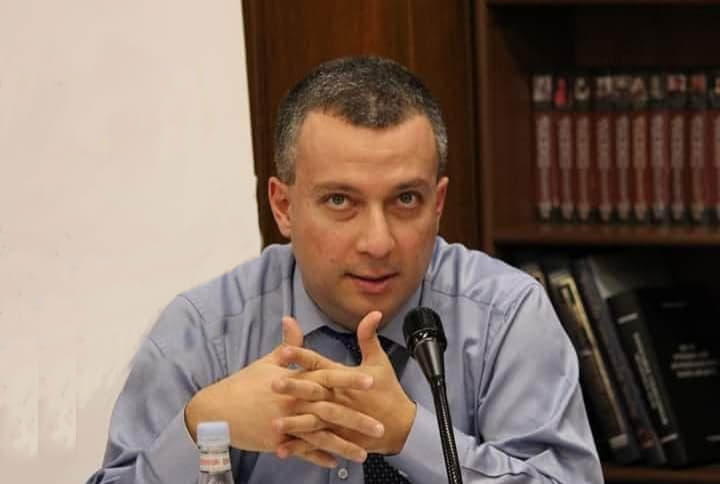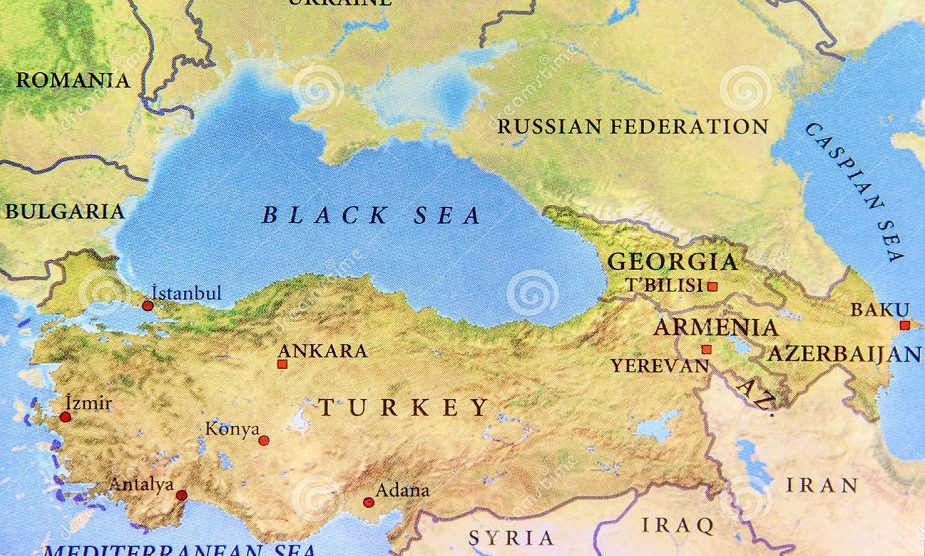The July 2020 escalation along Armenia – Azerbaijan international border and following events have again put Armenia – Russia – Azerbaijan – Turkey relations in the spotlight of media and expert community. In recent years there was a wide spread perception that Azerbaijan has been making efforts to improve its relations with Russia, while Armenia – Russia relations entered an unchartered waters after the 2018 “Velvet revolution”. The large scale purchases of Russian modern weaponry by Azerbaijan were the main driver of improving bilateral relations.
Arguably, after April 2016 four day war which proved that Azerbaijan is not able to militarily take large swaths of territories from Nagorno Karabakh Republic, Azerbaijani leadership was seriously thinking about the possibility of accepting “Lavrov plan”, a modified version of Madrid document, which envisaged the return of up to 6000 square km territories of NKR under the Azerbaijani control and the deployment of Russian peacekeepers along the new line of contact between NKR and Azerbaijan. Prior to 2018 Velvet Revolution this idea was rejected by Armenian and Karabakh authorities, as it was equal to Armenia and Karabakh capitulation. However, immediately after the revolution there were speculations that time is ripe for moving forward this plan. Many experts thought that the new Armenian leadership would be much more flexible during negotiations and prone to concessions. Simultaneously, the obvious freeze in Armenia – Russia relations immediately after the revolution triggered by some contentious steps of the new Armenian leadership raised hopes in Azerbaijan that if Armenia rejects Lavrov plan, Russia would force Yerevan to accept it, viewing it as some sort of punishment for alleged efforts to pull Armenia out of the Russian sphere of influence. Thus, according to this logic Azerbaijan should foster its relations with Russia and simply wait to see how Kremlin would increase its pressure over Armenia.
Obviously, Russia is the key player in Karabakh conflict settlement process, but not the only one. Turkey, Iran, the US and EU are all involved in South Caucasus geopolitics and are not happy to see the significant increase of Russian influence in the region through the implementation of Lavrov plan. However, Iran is on “survival mode” now and has no resources to actively influence regional geopolitics. President Trump administration showed great deal of indifference towards Karabakh conflict and towards South Caucasus in general. The only exception perhaps was Georgia, which had a legally defined strategic partnership with the US. Not surprisingly, Washington was actively involved in domestic political developments in Georgia and actually forced leader of the ruling “Georgian Dream” party Bidzina Ivanishvili to amend the electoral system prior to the October 31 parliamentary elections. However, besides involvement in Georgia and some efforts to include South Caucasus in its “maximum pressure” campaign against Iran, President Trump administration was not active in the region.
EU is present in South Caucasus through its “Eastern partnership” program having signed Association Agreement with Georgia and Comprehensive and Enhance Partnership Agreement with Armenia. However, EU lacks any hard power and apparently also willingness to influence Karabakh conflict negotiation process, and is fully satisfied by expressing support to the OSCE Minsk Group Co-Chairs efforts and by sending its special representative to three capitals for talks which has almost no influence on the ground.
Thus, beside Russia, the only external player in the region with sufficient capacity and will to seriously increase its influence is Turkey. In recent years Ankara has pursued an assertive foreign policy with clear defined strategy to become independent regional power with involvement in the MENA region, South Caucasus and Central Asia. Turkey has abandoned fixed pro-American policy and actively has implemented strategy of ad hoc alliances. Thus, Turkey opposes the US in Northeastern Syria and has limited cooperation with Russia and Iran in Northwestern parts of the country, while opposing Russia in Libya and realizing strategic balancing act between Russia and NATO in the Black Sea region.
Turkey views South Caucasus as an important neighborhood, a source of hydrocarbons and a vital bridge towards Central Asia. In recent two decades Turkey has spent time and recourses to establish and develop Turkey – Georgia – Azerbaijan strategic partnership. In this context, the improvements in Azerbaijan – Russia relations and the realization of Lavrov plan with the establishment of the de facto Russian military base in Azerbaijan has raised concerns in Turkey. This scenario will significantly increase Russian influence in the region which is not in line with Turkish strategic interests.
On the other hand, Turkey knows very well that the cornerstone of Russian influence in South Caucasus is Moscow’s strategic alliance with Armenia. If Russia forces Armenia to accept Lavrov plan, it will cause a serious damage to Armenia – Russia relations, will trigger long-term anti-Russia sentiments in wide segments of Armenian society and could be the beginning of the end of Russian dominant position in the region. Interestingly, Turkey faces a dilemma; to support Lavrov plan, which will significantly increase Russian influence in the region in short term perspectives but may lay foundations of its demise in longer run, or to seek blocking its implementation using its bonds with Azerbaijan.
Thus, prior to the July 2020 escalation there was a perception of growing Azerbaijan – Russia rapprochement probably aiming at the realization of Lavrov plan and deterioration of Armenia – Russia relations. The tough reaction of Armenian officials against April 21, 2020 Russian foreign minister Lavrov’s statement that since April 2019 a new document based on “Madrid principles” and phased approach solution has been discussed by Armenia and Azerbaijan, was another proof of freeze in relations between Yerevan and Moscow. In months prior to the escalation active discussions have been underway that Russia may force Armenia to accept Lavrov plan not only to gain strategic leverage over Azerbaijan but to trigger anti-government protests in Yerevan and to topple Pashinyan government.
The events of July 12-16 have changed this dynamic. Immediately after the escalation Azerbaijan criticized Russia for supplies of weapons to Armenia and President Aliyev raised his concerns during phone call with President Putin. Azerbaijan publicly denounced explanations on this issue provided by Russian Defense Minister Shoigu during his visit to Azerbaijan in late August 2020. Azerbaijan and Turkey launched several joint military drills in mainland Azerbaijan and Nakhijevan Autonomous Republic, and Turkish and Azerbaijani military leaderships made reciprocal visits to Baku and Ankara. The foreign policy advisor to President Aliyev Hikmet Hajiev was in Istanbul recently and reached an agreement to establish joint Azerbaijan – Turkey media holding to counter anti-Azerbaijani and anti-Turkish propaganda and promote bilateral interests.
Simultaneously, interesting developments have been registered in Armenia – Russia relations. Immediately prior to the recent escalation on the border Armenian court released the second President of Armenia Robert Kocharyan on bail from pre-trial detention. Given personal friendship between Kocharyan and Russian President Putin the ups and downs in criminal investigation against the second President were one of the indicators of Armenia – Russia relations. Kocharyan in the past has been already released from pretrial detention twice, in August 2018 and May 2019. At those occasions Prime Minister Pashinyan’s reaction to the court decisions was very negative. He called to block the entrances to court buildings in May 2019, and in late July 2019 criminal investigation was launched against the judge who released Kocharyan. Kocharyan himself was again arrested in June 2019. However, this time there was no public reaction from Pashinyan to the June 2020 court decision and Kocharyan has been in large for three months now.
Interestingly, the second President of Armenia has significantly increased his political activities recently and has met with experts and representatives of youth. He publicly criticizes Pahinyan’s government economic policy and blames Prime Minister of having no clear position over Karabakh settlement process. Thus, Kocharyan seeks to present himself as one of the centers of anti-Pashinyan opposition. In recent months several rallies have been organized in Yerevan demanding resignation of Pashinyan. Few participated in these rallies, but a year ago any public rally against the leader of revolution was simply unthinkable.
Meanwhile, on August 18, 2020 former Armenian Defense Minister (1999-2000) Vagharshak Harutyunyan was appointed as chief advisor to Prime Minister Pashinyan. Harutyunyan has a reputation of staunchly pro-Russian politician and has served in Moscow in CIS countries joint military headquarters in mid 1990s. This appointment has also domestic political context as Pashinyan wants to balance Kocharyan’s connections with Russia. However, the appointment of pro-Russian politician in this position also indicates that Pashinyan seeks to mend ties with Kremlin.
Another indicator of warming Armenia – Russia relations was the signature of protocol between Russian Transport Ministry and Armenian Ministry of Territorial administration and infrastructure according to which all issues related to the alleged financial irregularities in South Caucasus Railway Company (was created in 2008 when 30 year concession agreement was signed between Armenian government and Russian Railways Company) have been solved. Meanwhile in September 2018 during his meeting with President Putin Pashinyan stated that facts of embezzlement of 60 million USD had been identified in South Caucasus Railway Company and criminal investigation was launched.
The developments of recent two months may create a perception that situation in South Caucasus has turned back to its usual parameters. Turkey and Azerbaijan jointly oppose Armenia – Russia alliance with key goal to decrease Russian influence in the region, while Kremlin uses its strategic alliance with Armenia to solidify its position and to counter these moves. However, under the surface trends are not so obvious. Azerbaijan may use its recent active contacts with Turkey to put some pressure on Russia hinting that if Russia fails to force Armenia to make concrete steps towards the implementation of “Lavrov plan”, it may lose Azerbaijan. Interestingly, this can be done with tacit agreement and support from Turkey.
Meanwhile, despite recent moves by Prime Minister Pashinyan to improve relations with Russia, Kremlin still may consider him unreliable and unstable partner, who is ready to strategically change Armenian foreign policy at the first convenient moment. Thus, Moscow may continue to pursue its two pronged strategy – to reach the implementation of Lavrov plan and simultaneously to weaken Pashinyan’s government and to bring into power more reliable forces in Yerevan.
However, the key factor which will determine the geopolitics of the region in coming years is the evolution of Russia – Turkey relations. If Moscow and Ankara comes to terms on how to manage their rivalry in South Caucasus, Russia may think that serious damage to Armenia – Russia relations, which is inevitable in case of forcing Armenia to accept the Lavrov plan, is manageable. However, this scenario requires from Turkey to accept the establishment of Russian military base in Azerbaijan and the significant growth of Russian influence in the region for at least mid-term perspective (5-7 years). Much depends on Turkey’s strategic assessment of the future developments in Russia. If Ankara believes that in long term perspective (7-10 years) Russia will be significantly weakened both economically and demographically and will have no alternatives but to decrease its involvement in Post – Soviet space including South Caucasus, Turkey may be ready for short term cooperation with Russia including implementation of Lavrov plan.

Dr. Benyamin Poghosyan, Chairman, Center for Political and Economic Strategic Studies (Armenia)





